In this time of digital transformation, security is a top priority. More software is being built faster than ever before, and the pressure has never been more intense to release code faster. With more developers working on smaller teams, organizations need new ways to secure their code while maintaining flexibility.
Agile Model Driven Software Development provides an end-to-end methodology that enables all aspects of software development in a single, cohesive framework. Agile Model Driven Security (AMDS) provides innovative ways to ensure application security in an Agile software development environment with agile modeling techniques, open source technologies and unified modeling language constructs. In this book, best-selling author and agile modeling expert Jan Bosch shares his insights into developing agile models for the purpose of securing the software lifecycle from inception through deployment. The fundamental concepts underlying AMDS are outlined, along with a walkthrough of various AMDS processes and tools.
]ProjectOpen[

ProjectOpen is our top pick here because it is built for enterprise and offers multiple agile methodologies and tools. Since it was released back in 2003, ProjectOpen evolved to be the first choice for companies in healthcare, legal, finance and industrial sectors.
ProjectOpen is created by Frank Bergmann a German entrepreneur more than 20 years ago. It is a full-featured enterprise project management solution for large projects.
Unlike most tools on this list which primarily focuses on software development, ProjectOpen is used heavily in industrial sector especially because it offers multiple agile methods project management tools and.
MyCollab
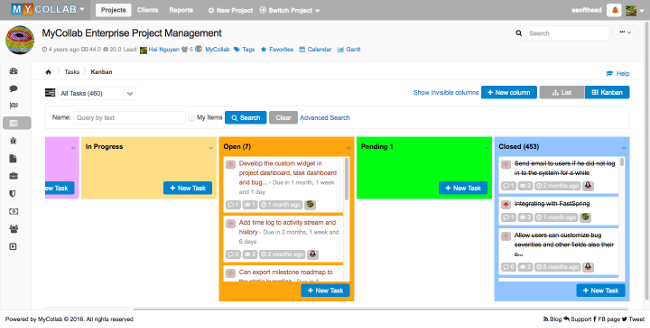
MyCollab is a suite of three collaboration modules for small and midsize businesses: project management, customer relationship management (CRM), and document creation and editing software. There are two licensing options: a commercial “ultimate” edition, which is faster and can be run on-premises or in the cloud, and the open source “community edition,” which is the version we’re interested in here.
The community edition doesn’t have a cloud option and is slower, due to not using query cache, but provides essential project management features, including tasks, issues management, activity stream, roadmap view, and a Kanban board for agile teams. While it doesn’t have a separate mobile app, it works on mobile devices as well as Linux, Unix, Windows, and MacOS.
The source code for the latest version of MyCollab is available on GitHub. It is licensed under AGPLv3 and requires a Java runtime and MySQL stack to operate. It’s available for download for Linux, Unix, Windows, and MacOS.
Taiga
Taiga is an open-source enterprise agile project management that utilize Scrum and Kanban frameworks. It is built with Python using Django Framework and uses AngularJS for frontend.
Taiga comes with built-in project progress monitoring, backlog manager, estimation and prediction tools, timeline manager, built-in issues and bug tracker and customizable dashboards with rich reporting blocks.
That is not all, Taiga supports multiple teams, multiple languages, and it is highly customizable as for the frontend and on the data level with custom tags and fields creation on the fly.
Phabricator
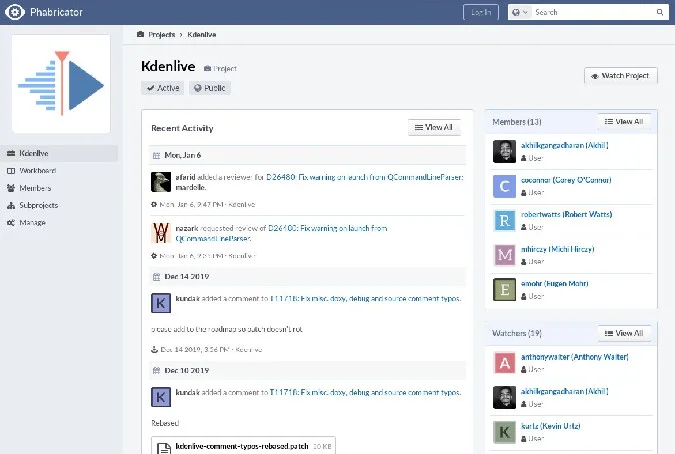
Phabricator is a collection of web apps by Phacility, and it contains far more tasks than the project advertises in its sales pitch. It’s unusual for a company to intentionally under sell their product, but that’s Phacility’s model, but don’t be fooled by their modesty. There’s Manifest for bug and issue tracking, Projects for Kanban workboards, Diffusion for Git hosting, Phame for blogging, the Phriction wiki, Harbormaster for CI/CD, Conpherence for team chat, and much much more. Everything is intregrated, so there’s no “rewiring” required to make your Kanban board affect your bug tracker. There’s a dashboard for all of the data, too, so tracking progress can happen at every level.
Phabricator is used by many active projects, including some big KDE applications, like Kdenlive and Krita, so its efficacy has been proven by teams distributed around the globe. It’s under constant development and tends to be open to feedback and enhancement requests.
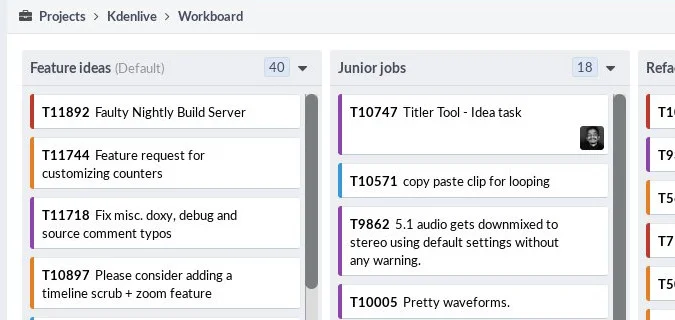
You can run Phabricator on your own server and purchase paid support, or you can pay Phacility for hosting (with a Support Pact included). It’s licensed under the Apache 2.0 license and is available from the project’s Github mirror.
Tuleap
Tuleap is an agile software management software package for building complex software solutions that require multiple teams.
It comes with a large set of integration options for 3rd-party services for developers like GitHub, Gitlap, ERP systems and messaging solutions like Slack.
Tuleap features agile project development, continuous development, issue tracking, bug management, test management, project documents management and requirements management.
The system is rich in graphs and charts that helps developers and project managers to track the project’s progress. It has a built-in Kanban board which boosts productivity to the next-level and customizable dashboards.
Gitlab
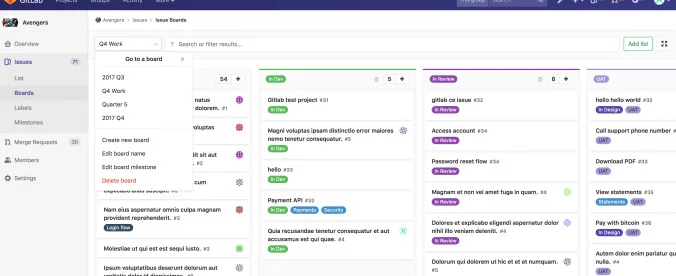
On the Internet, Gitlab is known as a website hosting open source projects in Git repositories. But within the walls of companies and organizations, Gitlab is possibly better known as an open source, locally installed web application for software development and project management. You can pay for hosting plans, or host it yourself, and if you’re running the community edition, then you’re running only open source components.
Gitlab’s community edition is distributed under the MIT license, and supports Agile development through scrum and kanban, sprint planning, epics, bug tracking, documentation, dashboards, charts, scheduling, automation, CI/CD, and more. There are many additional benefits, not the least of which is general developer familiarity with the platform. While many developers may have learned either Microsoft’s Github or just pure Git (the open source backend to Github, Gitlab, and many others), it’s fair to expect them to understand the workflow of using Git through a web interface.
For the project managers running the show, Gitlab’s interface is intuitive, consistent, and robust. A project manager doesn’t ever have to leave Gitlab. All tasks, from assigning tasks and planning sprints to accepting merge requests and deleting branches, can be done from within the Gitlab UI.
As Gitlab continues to develop, there’s every reason to believe that even more features for project management will be added. The Gitlab developers are happy to take feature requests and are quick to respond to feedback. You can download the Community Edition from Gitlab.com/install.
Kanboard

Kanboard is a free and open-source self-hosted Kanban project management. It is easy to setup on any private cloud or hosting and easier to use.
Kanboard organizes everything in boards with a vertical customizable Kanban layout which comes with advanced search and filtering options. It supports multiple authentication backends which makes it a perfect options for companies that have IDM “Identity and Access Management” systems.
The most amazing feature Kanboard has is it is translated to more than 30 languages.
Odoo
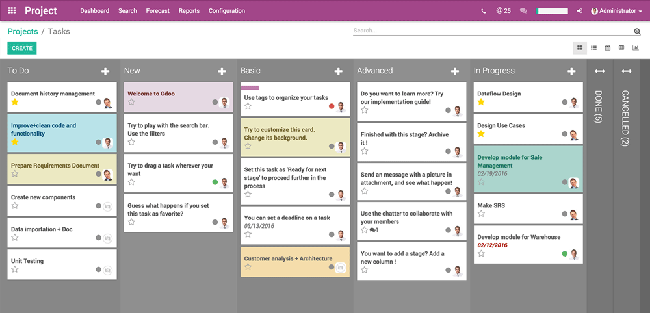
Odoo is more than project management software; it’s a full, integrated business application suite that includes accounting, human resources, website and e-commerce, inventory, manufacturing, sales management (CRM), and other tools.
The free and open source community edition has limited features compared to the paid enterprise suite. Its project management application includes a Kanban-style task-tracking view for agile teams, which was updated in its latest release, Odoo 11.0, to include a progress bar and animation for tracking project status. The project management tool also includes Gantt charts, tasks, issues, graphs, and more. Odoo has a thriving community and provides user guides and other training resources.
It is licensed under GPLv3 and requires Python and PostgreSQL. It is available for download for Linux, Windows, and Red Hat Package Manager, as a Docker image, and as source on GitHub.
Lavagna

Lavagna is an agile project management system for small teams. It is a lightweight with limited software and hardware requirement.
It features Kanban boards manager, tasks search, issues and bugs tracker, multi-projects support and multiple login providers (Google, Twitter, LDAP, Gitlab). Moreover, it supports OAuth login and grained access control.
Lavagna is an ideal solution for small teams which work in large enterprise because of its capabilities to integrate with enterprise IDM systems.
Focalboard
Are you searching for an alternative to Notion, Asana, and Trello?
Well, you can go for Focalboard, which is an open-source and self-hosted project management software. It helps to organize, manage, track, and define work across your teams by using the Kanban board view. It has two editions:
- Focalboard Personal Desktop: It is a desktop app for personal and to-do projects. It is a single-tenant that runs on a local server to get optimal performance and speed.
- Focalboard Personal Server: It is a self-hosted server to help collaborate better with your team.
Click over “add new boards” to pick project tasks from the different templates.
Change the created date, priority, sort settings, filter settings, and group by settings according to your preference. You can also drag cards from one column to another to change the group property. In addition, edit the cards whenever you want to know the set of properties and content and the list of comments.
Table views help you view the cards in a single place to hover over the title to open one. Furthermore, every board has card templates and board templates to customize each board as per your team. Get a Personal Desktop on your Mac and Windows or Personal Server on Ubuntu.
Wekan

You probably have heard or used Trello. So if you are a fan of it and looking for an open-source alternative then Wekan is your answer.
Wekan is very similar to Trello in every way except of course it is completely free and open-source which users can download and install it on their systems.

Conclusion
Investing so much on cloud paid project management and enterprise solution is not always a wise choice especially when there are many open-source alternatives to choose from. In this list we collected the best community-packed free agile project management packages for small and medium business to enterprise. We hope it will help decision makers to choose what fits their work and achieve more productivity.
If you have any other open-source agile project management package that we didn’t mention here, we would love to hear about in the comments below.
